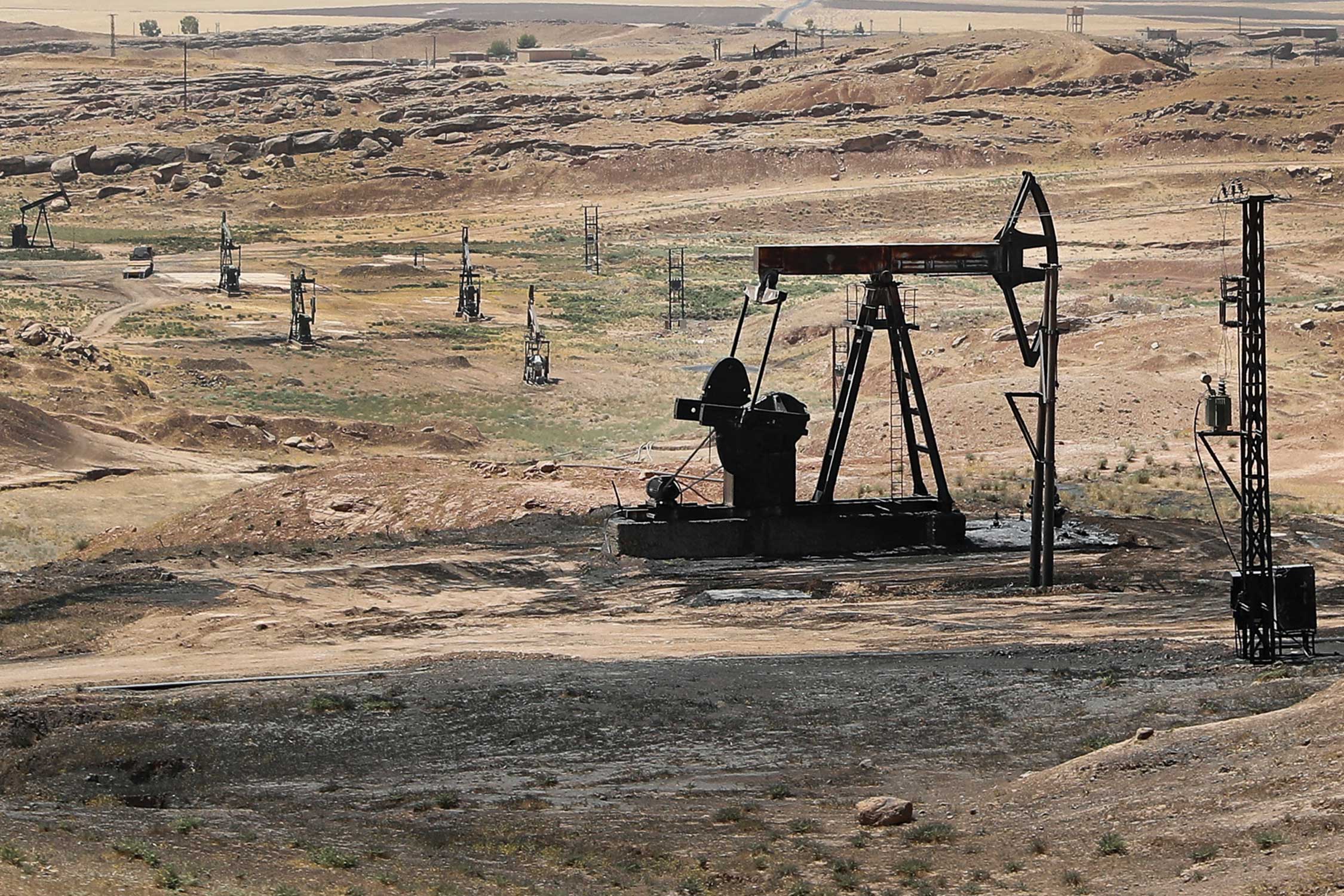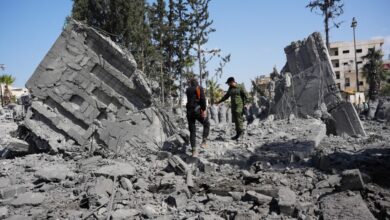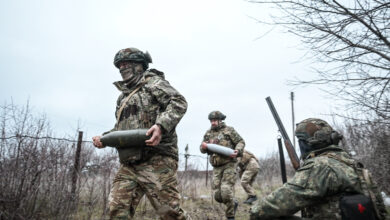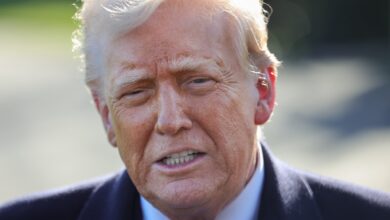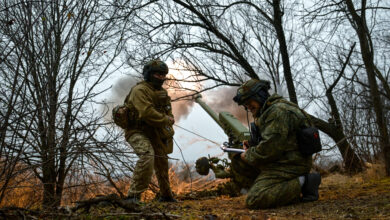US sanctions on Syria’s oil procurement network reaffirm America’s post-ISIS strategy
With most of Syria’s oil and gas under US partner force control, new sanctions raise questions about post-ISIS strategy and the war's complex partnerships
The U.S. Treasury Department last week announced new sanctions against four individuals and five entities which it has accused of facilitating fuel and weapons shipments to President Bashar al-Assad’s regime, showing renewed commitment to the administration’s strategy of economically isolating the Syria government.
Targets of the sanctions include Muhammad al-Qatirji, CEO of the Syria-based Qatirji Company and alleged middleman for regime oil deals with the Islamic State, and Yasir ‘Abbas, a figure allegedly instrumental in procuring foreign imports of crude oil for the Syrian Petroleum Ministry, according to the official statement.
Both men are also accused of facilitating weapons trafficking into Syria under the auspices of Damascus’ intelligence agencies.
The sanctions also target two other individuals and three companies part of a “large-scale fuel procurement network” allegedly aimed at evading U.S. sanctions to import large shipments of crude oil and natural gas to the Syrian port of Baniyas.
The network consists of Lebanon-based companies Abar Petroleum and Nasco Polymers, as well as UAE-based Sonex Investments, according to the statement.
“Today’s action shows that the United States will continue to take concrete and forceful action to cut off material support to the Assad regime and its supporters,” the State Department announced in a press release on Thursday, September 6.
The sanctions were enacted in accordance with an executive order signed by then-President Barack Obama in August 2011.
The Trump administration has sought to restrict the Assad regime’s access to oil and gas as part an economic strategy aimed at driving a wedge between Damascus and its allies.
Yet it was not immediately clear why Qatirji, whom the Treasury accuses of “providing supplies to ISIS-controlled areas,” would be sanctioned now.
In mid-August, U.S. Special Presidential Envoy to the anti-ISIS Coalition Brett McGurk told reporters that “about 99 percent of what used to be the [Islamic State’s] physical caliphate” had already been captured by the Syrian Democratic Forces and Coalition.
Qatirji’s deals with ISIS were first reported by Reuters in October 2017.
A spokesperson for the Treasury’s Office of Foreign Assets Control declined to provide reasons for the decision beyond those given in the official statement.
“Treasury sanctions are always imposed in order to change behavior,” Adam Smith, former senior advisor to the OFAC director under Obama, told The Defense Post. “If it doesn’t change behavior … then why would you impose sanctions?”
“They may have had this ready to go for the past few years,” Smith said. “They often have many [sanctions] ready to go and don’t actually implement them until the foreign policy or security rationale makes sense.”
The State Department did not respond to requests for comment.
Contesting Syria’s oil
Control over the Syrian government’s assets is a fundamental part of the current administration’s long-term strategy towards the Assad regime, State Department Special Representative for Syria Engagement James Jeffrey told The Defense Post in June, prior to his appointment.
The Qatirji group has been involved in more recent petroleum business activities, according to Syrian news reports, at a time when Syrian, Russian and Iranian companies are preparing to execute contracts to rebuild the country’s devastated hydrocarbon infrastructure.
In June, Muhammad al-Qatirji’s brother, Hossam, a member of parliament, announced the establishment of the Arfada Petroleum Company, which is jointly owned by the two brothers along with Muhammad’s son, Ahmed Bashir al-Qatirji.
The company was formed to specialize in oil and gas infrastructure, exploration, drilling and trading, according to Syrian news outlets.
Crude oil made up roughly a quarter of Syrian government revenue prior to the war, according to a 2010 International Monetary Fund report.
The Assad government lost control of nearly all of the country’s oil reserves as a result of the conflict, though it has been able to recapture at least some hydrocarbon fields with the help, albeit one step removed, of Russian-led paramilitary contractors from the Wagner group.
The U.S.-advised and assisted SDF outmaneuvered pro-regime troops to seize a large majority of the country’s oil and gas reserves from ISIS near Deir Ezzor as part of Operation Jazeera Storm beginning in September 2017.
At the time, the Pentagon dismissed suggestions of any ongoing race to capture Syria’s oilfields, a position contradicted both by members of the SDF and by unclassified U.S. Department of Defense GIS imagery obtained by The Defense Post in April.
The move, and years of aerial bombardment that has incapacitated the country’s hydrocarbon infrastructure, left Damascus powerless to transport a majority of the gas and crude oil to processing facilities in the government-controlled west.
Instead, the regime has relied on Russia and Iran for shipments of oil and gas, which Damascus has struggled to afford in the past, according to a classified U.S. intelligence document reported by The Daily Beast in January.
The government has vowed to retake the oil-rich northeast from the SDF by force if talks with the group should fail. “We don’t have any other options, with the Americans or without the Americans,” Assad told the Russian state-backed news network RT during an interview in May.
“Our challenge is how can we close this gap between their plans and our plans,” Assad said.
Preliminary talks aimed at building trust between the Syrian Democratic Council and the regime began in June. SDC Co-Chair Ilham Ahmed has denied the two sides discussed the topic of oil resources.
The Coalition has responded fiercely to pro-regime encroachments into SDF-held territory on the oil-rich east side of the Euphrates River near Deir Ezzor.
In February, hundreds of Russian paramilitary contractors from the Wagner group were reportedly killed by U.S. air and artillery strikes while assaulting the SDF-held Conoco gas field located some 10 miles (16 kilometers) northeast of Deir Ezzor city.
The attack may have been ordered by an associate of Russian President Vladimir Putin as a favor for Assad in conjunction with a Russian strategy to rebuild Syria’s energy sector while circumventing U.S. sanctions, according to reporting by The Washington Post and The Financial Times.
Both the Kremlin and Damascus denied initiating the attack and blamed the U.S. for the incident.
At the time, U.S. Defense Secretary James Mattis repeatedly denied knowing why pro-regime forces would attack an SDF base with U.S. forces present, but did not mention it was located at a strategic gas field.
Mattis later dismissed a reporter’s suggestion that the attack was related to the U.S.’ post-ISIS strategy against the Assad regime.
In late April, Mattis told the Senate Armed Services Committee that he personally had ordered the attacking force “to be annihilated. And it was.” In May, Politico reported that details of the Conoco incident were considered classified.
The devastating U.S. response to the February assault forced the Assad government to opt for subtler methods to regain access to those reserves, according to two local sources with knowledge of the efforts who requested anonymity for security reasons.
In June, Turkey’s Anadolu News Agency reported that the SDF had agreed to exchange 100 barrels of crude oil from the al-Omar field near Deir Ezzor for every 75 barrels of refined fuel.
The oilfield, Syria’s largest with nearly a quarter of the country’s reserves, was captured by the SDF assisted by U.S. Special Operations Forces in October 2017.
Details of the Anadolu report could not be independently verified by The Defense Post, but local sources confirmed similar oil transactions have been common in the area.
“The Kurdish forces supply more oil than the Turkish newspaper reported,” said one source familiar with the deals with the regime, noting that other fields under SDF control have also returned to operation.
In June, AFP quoted an official from a Turkish-backed rebel group claiming that his side was receiving as many as 60 crude oil tankers per day sent from Kurdish-held areas for refining.
SDF-controlled oil is sometimes shipped from Deir Ezzor through intermediaries to regime-controlled territory via Hasakah “under the pretext of investment,” according to the Defense Post source.
Access to the oil is “the main factor in the provocations that take place between the two parties in Deir Ezzor province,” the source said.
It is unclear if the reported SDF oil deals have any connection to the newly-sanctioned Qatirji group.
A spokesperson for the SDF did not respond to a request for comment.
Syria reconstruction
In mid-July, Chief of the Russian Armed Forces General Staff General Valery Gerasimov sent a letter to U.S. Chairman of the Joint Chiefs of Staff General Joseph Dunford inviting the U.S. to cooperate on postwar infrastructure renovation in Syria and to facilitate the return of refugees, Reuters reported in August.
The proposal was reportedly not well received in Washington. An internal U.S. memo cited in the Reuters report firmly denied any Kremlin insinuations that the Russian initiative was a result of discussions between President Donald Trump and Putin in Helsinki in July.
Earlier this year, Trump repeatedly stated that U.S. forces would be pulling out of Syria, sowing doubt as to the administration’s commitment to the mission.
Acting Assistant Secretary of State for Near Eastern Affairs David Satterfield, who first presented the administration’s strategy towards post-ISIS Syria to the Senate Foreign Relations Committee in January, reaffirmed the administration’s stance on August 17.
“We have been very clear – as clear as it is possible to be – with the Government of Russia that there will be no international reconstruction assistance for Syria without the irreversible political process validated by the U.N.,” Satterfield told reporters, adding, “There should be no ambiguity about that.”

